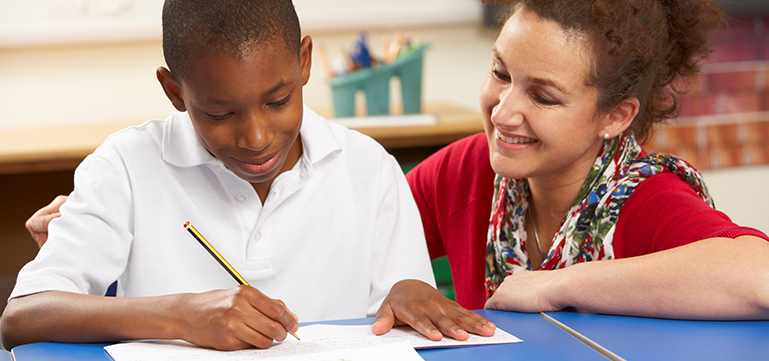Effective practice |
Increasing literacy skills at an early age

Provider
Number of pupils
52
Age range
3-4
Date of Inspection
Information about the school
Brynteg Nursery School is a local authority maintained standalone nursery, situated in the village of Abersychan, near Pontypool, in Torfaen, South Wales. The school serves a wide area and there are currently 52 pupils on role, all aged between three and four years. Children attend on a part-time basis with the exception of a very few who meet the local authority criteria for a full-time placement. All children speak English as their first language. The school employs two full-time teachers (the headteacher and assistant headteacher), and one full-time and three part-time support staff.
Context and background to sector-leading practice
Since the previous inspection in 2012, the high focus priority areas for development have been staff training, resourcing, and making further improvements in order to develop pupils’ literacy skills and their parents’ understanding of how schools teach literacy skills in the early years.
Description of nature of strategy or activity
Writing has high status in the nursery, and children produce writing during most activities. Brynteg’s highly skilled practitioners know that it is vital for early writers to have the opportunity to use writing for a purpose within “their world” in both the inside and the outdoor environment. In order to develop their writing skills, practitioners consider that it is important that they give all pupils the opportunity to write for a range of purposes in both English and Welsh. Purposeful planning, which incorporates assessment, allows children to contribute powerfully to their own learning and become highly independent learners, who are unafraid of taking risks and who learn from their mistakes.
Practitioners believe passionately that in order to ensure that children become lifelong enthusiastic writers it is essential to focus on developing and valuing essential writing skills early. Children develop their gross motor skills through practical and sensory activities such as dough disco and large scale sensory mark-making activities, using a wide range of resources such as ribbon sticks, shaving foam, sand rakes, ice, gloop etc. Practitioners highlight the importance of developing these skills to parents and carers. They arrange workshops to enable parents to understand the philosophy of early skills development. These opportunities develop the children’s confidence in exploring more formal writing resources at the appropriate time within their individual developmental journey. When children recognise themselves as writers, (i.e. their pre-writing skills are firmly embedded), they become inspired to write for a range of purposes in all areas of provision.
Writing does not occur in one specific area of the nursery but is present in all areas, for example planning sheets in block building area. The children write labels such as signs or menus in role-play areas in the nursery. Children also label displays and write their own names on their individual pieces of work for displays. Practitioners’ role is to ensure that they present children with a wide range of mark-making and writing opportunities to explore independently.
Observations highlight that children then value themselves as writers and are able to read back what they have written confidently. Practitioners bind stories written by children properly, giving them high status and they, in turn, form part of the nursery reading materials, read by children independently and by staff to their peers. Children describe themselves as Authors, understanding that when they write stories they are doing an important and valuable job, which they can share with others.
Practitioners observe the stages in each child’s journey to becoming a writer closely on a daily basis, and provide appropriate challenge and support where necessary. Staff share their observations during daily responsive and reflective planning sessions. The nursery plans for and resources the next steps in children’s learning, based on these meetings, and is flexible to take account of current needs/interests.
What impact has this work had on provision and learners’ standards?
Many children start nursery with skills at or below the expected level for their age. The nursery has developed a rigorous assessment and tracking system, which focuses on the curriculum and literacy and numeracy framework skills. Leaders collect and analyse this data on a termly basis from entry. This analysis shows that most children generally make very strong progress during their time at nursery. Termly data analysis influences planning and enables practitioners to focus on specific areas of skill development.
Children at Brynteg Nursery are confident speakers, engage in conversations with others using a wide range of vocabulary, and listen well to adults and other children. Their thinking and problem-solving skills develop well and they apply them independently in play. They are confident to “have a go” at writing and practitioners value their attempts. Most pupils make excellent progress in developing their writing skills. Children make marks using correct pencil grip and attempt to spell difficult words such as ‘strawberry’ and ‘butterfly’ confidently, using their phonic skills.
How have you shared your good practice?
The nursery has shared this good practice with practitioners from four neighbouring authorities by hosting a series of open days. It has also been included within the regional consortium’s Communication Matters training. As part of this course, attendees spend a day at the nursery making focused observations, and receive input / engage in professional dialogue with teaching staff. Staff have also delivered sessions as part of the regional consortium Foundation Phase module training on Experiential Learning. The nursery has produced a standardised portfolio of mark making, which includes quality examples of work at all developmental stages. The nursery has shared this with other schools/settings during training.
Practitioners share information about children’s progress in developing skills with their parents and pass relevant information to the feeder primary schools early in the summer term via face-to-face meetings and observation sessions at the nursery. It also shares all up-to-date assessment data with transition schools and parents.
Useful links
Provider: